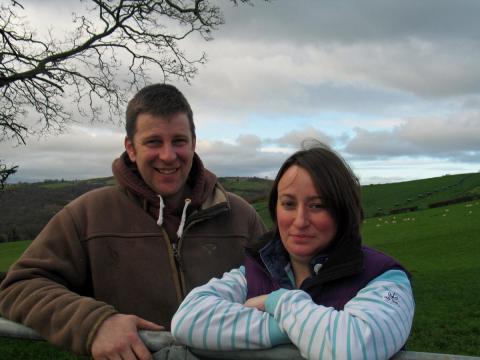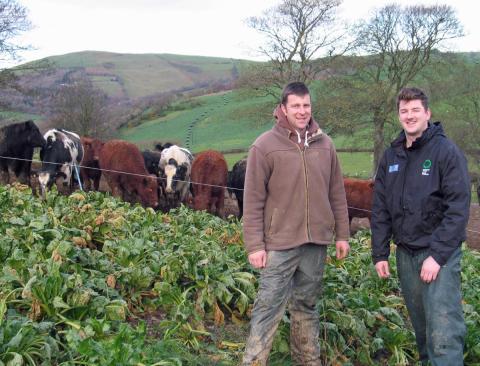An innovative Conwy farmer is yielding a cash saving of nearly £6,000 a year thanks to support from leading agricultural experts.
Arthur and Menna Williams from Llannefydd, Conwy have gained knowledge, advice and subsequently success from identifying a higher yielding forage crop to feed to their cattle and sheep enterprise at Carwed Fynydd farm.
A field of 7.5 acres was planted with Robbos fodder beet on their upland farm earlier this year with the aim of evaluating the cost and production benefit of growing Fodder Beet instead of Kale, or to see if there was an opportunity for both crops to complement each other.
“We were keen to look at reducing our wintering costs of silage and bedding for our suckler cows,” explains Arthur Williams, 37, who farms in partnership with wife Menna, and his parents, Dilwyn and Marian Williams.”
“We also wanted to look at reducing the costs of wintering the sheep off the farm. We’ve been astounded by the project outcome, and look forward to welcoming people to the farm on the 11 of December to see the full results for themselves.”
Costs of feeding, bedding and labour involved with the 120 Limousin and British Blue cross suckler cows at Carwed Fynydd was one element Arthur Williams was keen to tackle in addition to reducing the wintering costs associated with sending 600 of the 800 Lleyn ewes off the farm to Chester between the months of October to March.
Traditionally Arthur would winter some of his cattle on a kale and silage system, one of the benefits of the free draining soil at the 580ft above sea level upland farm at Llannefydd. Comparing the costs of growing fodder beet with the kale crop originally sowed at Carwed Fynydd demonstrated that no extra costs were occurred to the business and that it was actually more financially viable than kale to grow. The real advantage of the fodder beet crop is that it provides a much higher yield as cattle and sheep feed, so less land is required to grow the winter feed needed on the farm.
The additional benefits seen at Carwed Fynydd is the crop rotation elements on site. As fodder beet is not a brassica, the farm is not susceptible to the risk of disease club root. Sowing fodder beet, a full season crop, it can follow a brassica crop in the second year of plantation, ready for early sowing. This means that Carwed Fynydd gains a year in the required break needed before the next brassica crop is sown, enhancing crop rotation on the farm.
Emyr Owen, Farming Connect’s north Wales Red Meat Technical Officer who’s worked with the family at
Llannefydd said: “We’re delighted that the farm enterprise at Carwed Fynydd will see a three to one return on their investment with the new fodder beet crop compared to the original kale. The financial saving is a key element. Producing cattle and sheep feed on less than half the allocated original land is a pure efficiency gain.
“This year, 20 breeding heifers will be outwintered on the fodder beet crop for around 150 days, with 500 in lamb ewes grazing the other end of the field for around 70 days. Bales of silage will be carried out to the field in addition, during the harshest winter months,” he said.
The 120 Limousin and British Blue cross suckler cows at Carwed Fynydd calve during a three month period from April. 40 of the cows are put to a Salers bull to produce homebred replacements with the remainder put to Charolais bulls producing store cattle. Until recently these were sold at 20-22 months as forward store but in future they will be sold as yearlings. This will allow more breeding cows to be kept to increase farm output.
A flock of 800 Lleyn ewes are kept by the Williams family, with 300 put to Aberfield rams to produce future replacements. The older 500 ewes are put to Texel and Charollais rams for finished lamb production. Lamb sales commence around the middle of May.
Arthur Williams first came into contact with the Farming Connect project through the local Conwy Discussion Group set up for local farmers in the area by Conwy Development Officer, Guto Owen. He feels that sharing ideas and discussing relevant agricultural topics benefits the sector.
“Arthur’s desire to research new techniques and look strategically at his farm enterprise means better returns from his beef and sheep enterprise. He now has the potential to increase stock numbers, his workload is reduced and he also improves the carbon footprint of the farm, as his feeding, bedding and haulage costs are reduced. Carwed Fynydd is an example of how other red meat producers can improve and enhance their farm enterprises,” concluded Emyr Owen.
A Farming Connect Focus site event will be held at Arthur and Menna Williams, Carwed Fynydd Farm, Llannefydd, Conwy LL16 5EH on Monday 11 December 2017 from 2:00pm until 4:30pm. Titled a guide to outwintering sheep and cattle on fodder beet and kale, guest speakers include: Charlie Morgan from Grassmaster and Mark Jones from ADAS. Refreshments will be served and pre-registration for the event is essential. Email emyr.owen@menterabusnes.co.uk or call 07932 610697.


